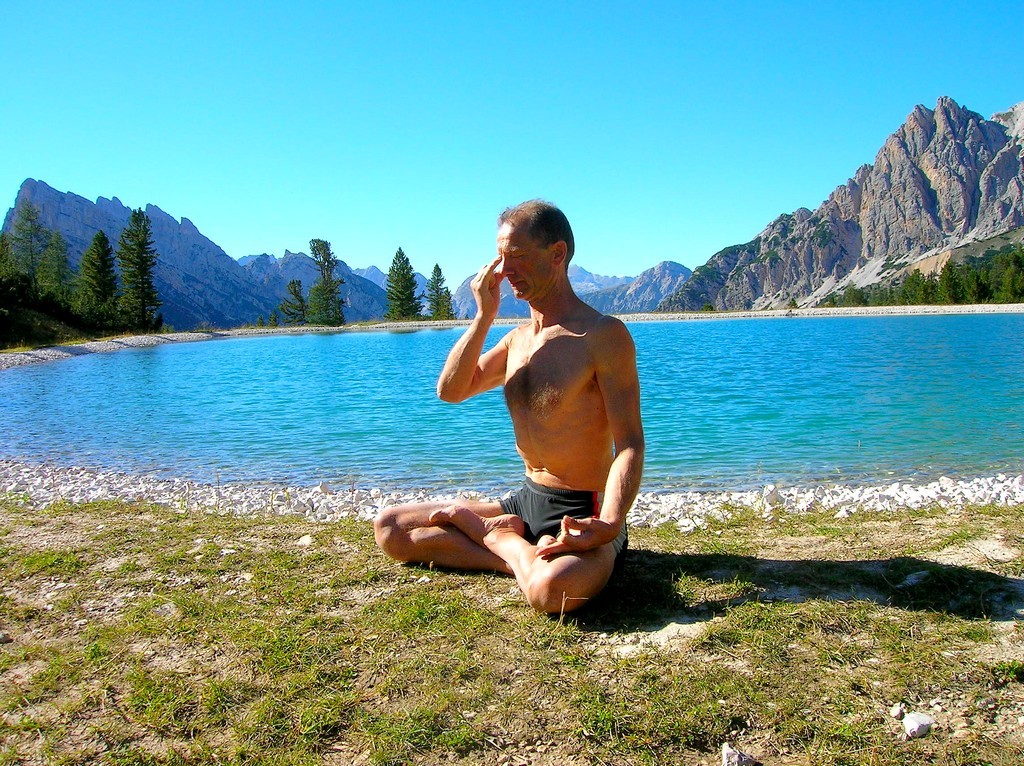Tips for Yoga Pranayama
Tips for Yoga Breathing Exercises
One of the best parts of yoga is yogic breathing exercises or yoga pranayamas and you will find a huge collection of them in the following section, Free Online Yoga Breathing Exercises. There you will find detailed instructions as well as videos on how to do these life transforming techniques. In this article I will offer some tips on how to get the most out of these yoga pranayamas
The two pranayamas (Yoga Breathing Exercises) which I strongly recommend to all is Kapalbhati Pranayama and Anuloma Viloma (Alternate Nostril Breathing). These two breathing exercises are amongst the best and below are some helpful tips for you to get the most out of them.
Note, that the titles below are links to the specific chapters which have complete details about these wonderful techniques.

If you really want to feel the tremendous power of this pranayama and the peace it can bestow try the following technique. When doing the breathing, to ensure you are doing long, slow and deep breathing, do it such that you do it without making any sound. So the breathing should be done absolutely quietly. This requires some patience and discipline, but is well worth it as this pranayama can single handedly transform you.
In brief Anuloma Viloma pranayama is great for bestowing unearthly peace and for helping to balance and refine the entire system at all levels.
For health and well-being there is no better breathing exercise that Kapalbhati Pranayama. It is great for weight loss, your digestive system, your respiratory system and for purging the system of negativity.
Kapalbhati can be easily done during daily activity, so when watching TV, taking a walk or driving, go ahead and practice this pranayama. You should initially try to build up to 400 repetitions, which should translate to about 5 minutes. Do sets of 50 (or less if just starting out), with short breaks, then slowly increasing the number of repetitions in each set. Later you can build up to 10 minutes.
Breath of Fire can be quite frustrating for those who are just beginning yoga. It is the one of the most common questions I get when it comes to pranayamas. The constant complaint is that yogis cannot maintain the rhythm for a sustained period of time and are constantly having to reset and start over.
There is essentially one reason for this. The inhalation and exhalation are not equal, and for you to do Breath of Fire Kundalini Yoga style without resetting, the inhalation and exhalation quantity of air needs to be the same. This is the key to Breath of Fire and it takes time to get this correct. So if you are new to Breath of Fire, stay with it and with practice will come mastery.
More Yoga Tips
You can get more yoga tips to help you with your yoga practice in the following articles:
5 Simple Yoga Tips to Elevate Your Practice




I think this will be handy for me when I need to calm the hell down at work.
Veer,
Go here: https://anmolmehta.com/2008/05/14/learn-how-to-meditate-beginner-meditation/
It helped me when I had the same issues.
-Ashley
Dear Anmol,
I am 18 yrs old and too tired and bored with my lifestyle..It’s full of stress, competition and ambition to become successfull..My daily routine has become very monotonous and dry..There is constant worry and it’s affecting me very hardly…I want to come out of this mess
I have no prior knowledge of yoga…Please tell which pranayama, yogasanas I should do as a beginner and regain track of my life and health again.
where do i get answers to my questions?
It is said that pranayama especially kapalbhatti must be performed on an empty stomach… but as per your blog you say that it can be done anytime … aren’t these statements contradictory?
should pranayma be a problem if i have enlarged adenoids. do i hav to follow special rules? or i should not do pranayama at all